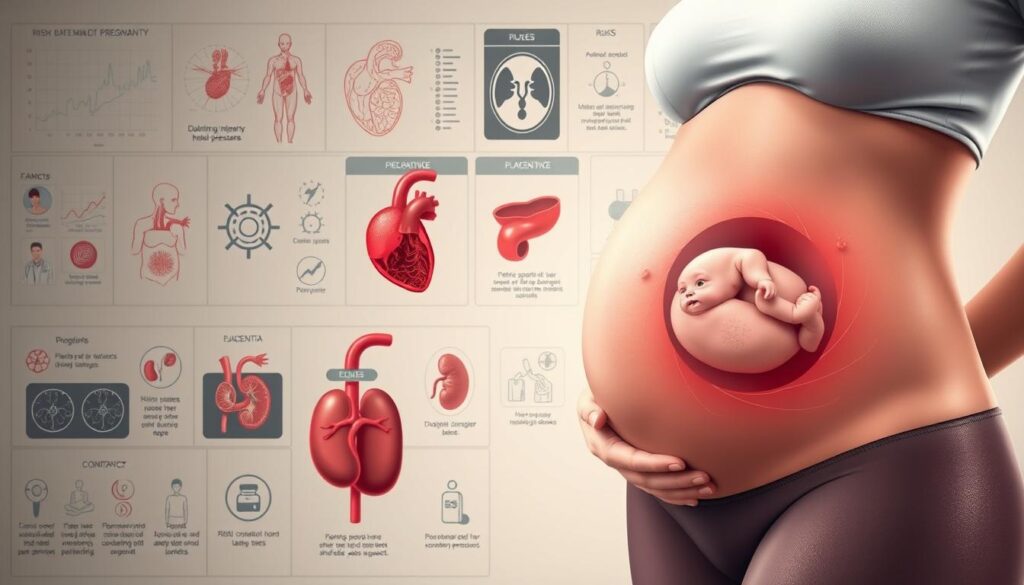Managing high blood pressure during pregnancy is crucial for the health and well-being of both mother and baby. Hypertension can lead to complications, making it essential to explore safe and effective management options.

Expectant mothers can take proactive steps to maintain healthy blood pressure levels by making lifestyle adjustments and incorporating natural remedies for hypertension. A healthy pregnancy is achievable when high blood pressure is managed properly.
Table of Contents
ToggleKey Takeaways
- Understanding the risks associated with high blood pressure during pregnancy.
- Exploring safe and effective natural remedies for hypertension.
- Lifestyle changes that help manage blood pressure levels.
- The importance of monitoring blood pressure during pregnancy.
- Tips for maintaining a healthy pregnancy with hypertension.
Understanding Hypertension During Pregnancy
Managing hypertension effectively during pregnancy starts with understanding its different forms and how they impact pregnancy. Hypertension, or high blood pressure, is a condition that can pose significant risks to both mother and baby if not properly managed.
Types of Hypertensive Disorders in Pregnancy
Several types of hypertensive disorders can occur during pregnancy, each with its own set of characteristics and potential complications. Gestational hypertension is high blood pressure that develops after 20 weeks of gestation, without the presence of protein in the urine. Preeclampsia is a more severe condition characterized by high blood pressure and often accompanied by significant amounts of protein in the urine. Other forms include chronic hypertension, which is high blood pressure that was present before pregnancy, and chronic hypertension with superimposed preeclampsia, where preeclampsia develops on top of chronic hypertension.
Understanding these different types is crucial for managing them effectively. For instance, preeclampsia requires close monitoring and possibly early delivery, while gestational hypertension may be managed with lifestyle changes and careful observation.
Normal Blood Pressure Changes Throughout Pregnancy
Blood pressure changes throughout pregnancy due to various physiological changes. Typically, blood pressure decreases slightly during the first and second trimesters due to the dilation of blood vessels. However, it tends to rise again in the third trimester. Monitoring these changes is crucial to identifying any deviations from the norm that may indicate a potential issue.
Expectant mothers should be aware of their blood pressure readings and understand what constitutes a normal range during pregnancy. Regular prenatal check-ups are vital for tracking blood pressure and detecting any abnormalities early on.
By understanding the types of hypertensive disorders and the normal fluctuations in blood pressure during pregnancy, expectant mothers can better navigate their pregnancy journey, making informed decisions in collaboration with their healthcare providers.
Risks and Complications of High Blood Pressure During Pregnancy
Pregnancy complicated by hypertension poses significant risks to the health of both the mother and the fetus. High blood pressure during pregnancy can lead to various complications that affect not only the mother’s health but also the development of the baby.
Maternal Health Concerns
High blood pressure during pregnancy increases the risk of cardiovascular diseases in mothers. It can lead to complications such as preeclampsia, a condition characterized by high blood pressure and often accompanied by significant amounts of protein in the urine. Preeclampsia can progress to eclampsia, a severe condition that can cause seizures and other life-threatening complications.
Other maternal health concerns include:
- Placental abruption: a condition where the placenta separates from the uterus, potentially depriving the baby of oxygen and nutrients.
- Kidney damage: High blood pressure can strain the kidneys, potentially leading to kidney damage or exacerbating existing kidney problems.
- Stroke and heart problems: The increased strain on the heart and blood vessels can lead to serious cardiovascular issues.
Potential Effects on Baby’s Development
High blood pressure during pregnancy can also have significant effects on the baby’s development. Some potential issues include:
- Growth restriction: High blood pressure can reduce blood flow to the placenta, potentially restricting the baby’s growth.
- Preterm birth: In some cases, high blood pressure may necessitate early delivery, which can lead to complications associated with preterm birth.
- Low birth weight: Babies born to mothers with unmanaged high blood pressure are more likely to have low birth weight, which can increase the risk of health problems for the baby.
The following table summarizes the potential risks associated with high blood pressure during pregnancy:
| Maternal Health Concerns | Potential Effects on the Baby |
| Preeclampsia and eclampsia | Growth restriction |
| Placental abruption | Preterm birth |
| Kidney damage, Stroke, and heart problems | Low birth weight |

Understanding these risks emphasizes the importance of managing hypertension during pregnancy. By controlling high blood pressure, expectant mothers can significantly reduce the risk of complications for both themselves and their babies.
Natural Ways to Control High Blood Pressure During Pregnancy
Pregnant women can naturally manage high blood pressure through dietary adjustments and lifestyle modifications. Making informed choices about what to eat and what to avoid can significantly impact blood pressure levels.
The DASH Diet for Expectant Mothers
The DASH (Dietary Approaches to Stop Hypertension) diet is highly recommended for pregnant women with high blood pressure. This diet focuses on consuming fruits, vegetables, whole grains, lean proteins, and low-fat dairy products. It’s rich in nutrients and fiber, which can help lower blood pressure.
Key components of the DASH diet include:
- High intake of fruits and vegetables
- Inclusion of whole grains like brown rice, quinoa, and whole-wheat bread
- Lean protein sources such as poultry, fish, and legumes
- Low-fat or fat-free dairy products
Essential Nutrients for Blood Pressure Regulation
Certain nutrients play a crucial role in regulating blood pressure. These include:
| Nutrient | Food Sources | Benefit |
| Potassium | Bananas, spinach, avocados | Helps lower blood pressure by balancing sodium’s effects |
| Calcium | Dairy products, leafy greens, fortified plant-based milk | Supports blood vessel function |
| Magnesium | Nuts, seeds, and whole grains | Relaxes blood vessels, improving blood flow |
Foods and Substances to Avoid
To manage high blood pressure during pregnancy, it’s equally important to know what to avoid. Limit or avoid:
- High-sodium foods and processed snacks
- Caffeine and sugary drinks
- Foods high in saturated and trans fats
By making these dietary adjustments and being mindful of nutrient intake, pregnant women can better manage their blood pressure and support a healthy pregnancy.
Safe Exercise Recommendations for Managing Prenatal Hypertension
Exercise plays a crucial role in controlling prenatal hypertension, and there are several safe options for expectant mothers. Regular physical activity can help lower blood pressure and improve overall health during pregnancy. However, it’s essential to choose exercises that are safe and suitable for pregnant women with hypertension.
Low-Impact Cardiovascular Activities
Low-impact cardiovascular exercises are excellent for pregnant women with hypertension. These activities improve heart health without putting excessive strain on the body.
- Brisk walking
- Swimming
- Cycling on a stationary bike
- Low-impact aerobics
Gentle Strength and Flexibility Exercises
Gentle strength and flexibility exercises can also be beneficial. These help maintain muscle tone and flexibility without risking high-impact stress.
- Yoga (prenatal classes)
- Pilates
- Lightweight lifting with proper guidance
- Stretching exercises

Exercise Precautions and Warning Signs
While exercising during pregnancy, it’s crucial to be aware of the warning signs that indicate the need to stop and consult a healthcare provider.
| Warning Signs | Action to Take |
| Dizziness or fainting | Stop exercising and rest |
| Chest pain or severe shortness of breath | Seek immediate medical attention |
| Vaginal bleeding or leakage of fluid | Contact your healthcare provider immediately |
Stress Management and Relaxation Techniques
High blood pressure during pregnancy can be exacerbated by stress, making relaxation techniques essential. Expectant mothers can benefit from various stress management strategies to maintain their overall well-being and that of their baby.
Mindfulness and Meditation Practices
Mindfulness and meditation are powerful tools for managing stress. These practices involve focusing on the present moment and can help reduce anxiety and promote relaxation.
- Meditation: Regular meditation can lower blood pressure and reduce symptoms of anxiety and depression.
- Mindfulness Exercises: Activities like deep breathing, yoga, and guided imagery can help expectant mothers stay calm and centered.
Prioritizing Quality Sleep and Rest
Getting enough sleep is crucial for managing stress and maintaining healthy blood pressure. Pregnant women should prioritize rest and establish a relaxing bedtime routine.
Tips for Better Sleep:
- Maintain a consistent sleep schedule.
- Create a comfortable sleep environment.
- Avoid caffeine and electronics before bedtime.
Effective Breathing Exercises
Breathing exercises can help calm the mind and body. Techniques such as diaphragmatic breathing can be particularly beneficial.
How to Practice Diaphragmatic Breathing:
- Find a comfortable seated or lying position.
- Place one hand on your belly and the other on your chest.
- Inhale deeply through your nose, allowing your belly to rise.
Conclusion
Expectant mothers can significantly reduce their risk of pregnancy-related complications by adopting a comprehensive approach to managing high blood pressure. This includes making dietary changes, engaging in safe exercise, and practicing stress management techniques.
By following the natural methods outlined in this article, women can promote a healthy pregnancy and minimize the risks associated with hypertension. A balanced diet, such as the DASH diet, rich in essential nutrients, can help regulate blood pressure. Regular low-impact cardiovascular activities and gentle strength and flexibility exercises can also contribute to a healthy pregnancy.
Effective stress management techniques, including mindfulness, meditation, and prioritizing quality sleep, can further support overall well-being. By being proactive and informed, expectant mothers can take control of their health and work towards a successful pregnancy outcome.
